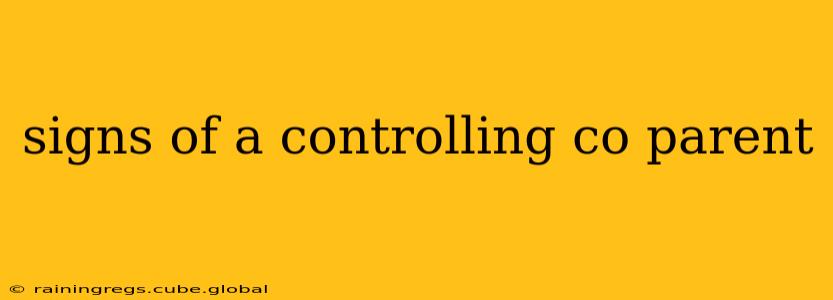Co-parenting after separation or divorce can be challenging, but it's crucial for the well-being of the children involved. However, some co-parenting situations become toxic due to one parent exhibiting controlling behaviors. Recognizing these signs is the first step towards protecting yourself and your children. This article will explore common signs of controlling co-parenting, offering insights and strategies for navigating these difficult situations.
What are the Signs of a Controlling Co-Parent?
A controlling co-parent seeks to dominate all aspects of the children's lives, often undermining the other parent's authority and creating unnecessary conflict. This control can manifest in numerous ways. Let's explore some key signs:
1. Excessive Micromanagement of Parenting Decisions
This includes constantly questioning your parenting choices, criticizing your methods, and attempting to dictate every detail of your child's routine, activities, and upbringing. For example, they might insist on controlling mealtimes, bedtime routines, or even the clothes your child wears. This isn't about offering constructive feedback; it's about exerting control.
2. Undermining Your Authority in Front of the Children
A controlling co-parent may consistently belittle your parenting in front of your children, questioning your decisions, and creating confusion and insecurity for the kids. This can damage your relationship with your children and undermine their trust in you.
3. Manipulating or Withholding Information
This involves deliberately withholding crucial information about the children's schedules, health, or school activities. They might change plans without notifying you, creating unnecessary stress and inconvenience. They might also manipulate information to paint you in a negative light.
4. Using the Children as Messengers or Pawns
A controlling parent might use the children to relay messages or demands to you, turning them into intermediaries in adult conflicts. This places undue burden on the children and can negatively impact their emotional well-being.
5. Excessive Monitoring and Surveillance
This could include excessive calls or texts checking on the children’s whereabouts, demanding constant updates on their activities, or even using technology to track their location. This behavior is invasive and goes beyond reasonable parental concern.
6. Ignoring Court Orders or Agreements
Continuously violating court orders or parenting agreements is a clear sign of control. This could involve ignoring visitation schedules, failing to contribute financially to the children's needs, or actively preventing you from exercising your parental rights.
7. Creating Guilt or Fear
They may manipulate your emotions, using guilt or fear to control your actions and decisions related to the children. This can be subtle or overt, often involving threats or emotional blackmail.
8. Controlling Communication
They may dictate when and how you communicate, restricting your contact with the children or limiting your ability to discuss important matters concerning their well-being.
9. Gaslighting and Emotional Abuse
They might deny or distort reality, making you question your own perception and sanity. This emotional abuse can severely impact your mental health and make it difficult to advocate for yourself and your children.
10. Financial Control & Withholding Support
This involves controlling the finances related to the children, withholding financial support, or using money as a means of control.
How to Cope with a Controlling Co-Parent
Dealing with a controlling co-parent is immensely challenging. Prioritize documenting all interactions, including emails, texts, and court orders. Seek support from a therapist or counselor who specializes in high-conflict divorce and co-parenting. Consider joining a support group for parents in similar situations. Remember that prioritizing your mental health and well-being is crucial. Finally, consult with a family law attorney if necessary to enforce court orders or protect your rights and those of your children.
This information is for educational purposes only and does not constitute legal advice. If you are experiencing difficulties with a controlling co-parent, it's essential to seek professional guidance.
